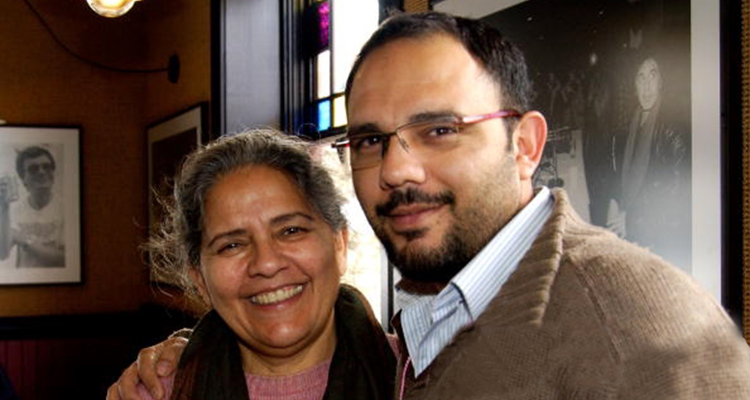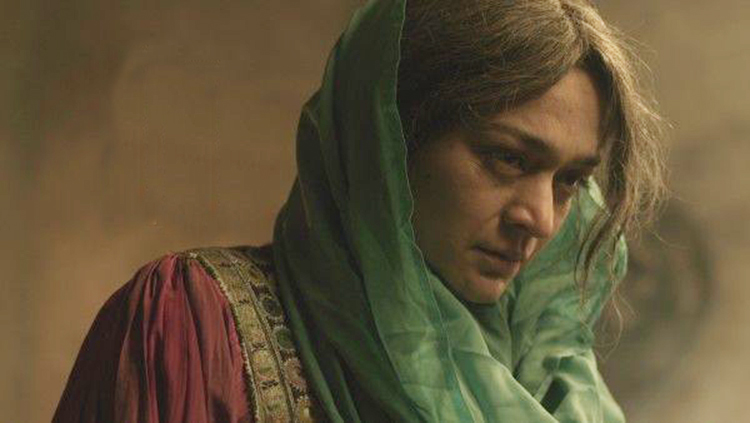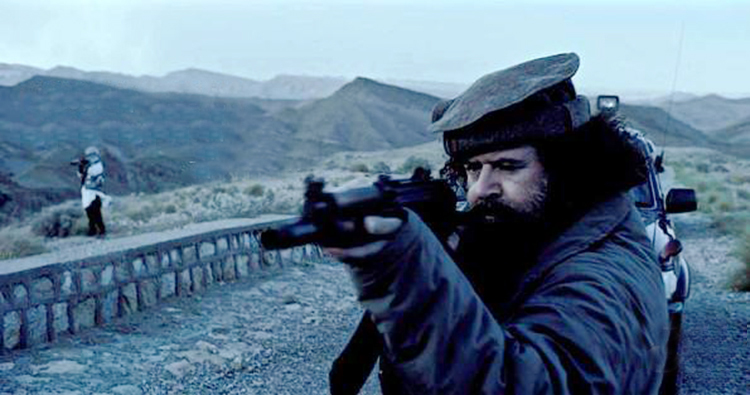Written by: Aiza Azam
Posted on: June 22, 2016 | 
Jami Mahmood (photo: dawn.com)
Known as the talented music video director Jami, he brought groundbreaking work like Pal do Pal by Najam Shiraz, Duur, Dhaani and Anjaane by Strings, Iss Bar Milo by Hadiqa Kiani, and Bum Phatta by Ali Azmat, that were creative and broke the traditional mold. When buzz began to spread about his film Moor, his debut directorial venture on the big screen, expectations soared, and were fully met. Seeking insight into the experiences that shaped this talented director, we discover what feeds his natural talent.
A young teenager in the pre Zia era, Jami struggled with school in an extended family of academic achievers. He describes that period as “dark, depressing, days”. His parents had separated at that time, and would reunite twenty years later. The children lived with their father.

Dr. Quratulain Bakhteari, Jami’s mother and a huge influence in his life, is a distinguished activist. Having worked on such projects as the groundbreaking Orangi Pilot Project in Karachi with Akhtar Hameed Khan, she has been nominated for the Nobel Peace Prize for a lifetime’s worth of achievements. Her social activism, by her own admission, is rooted in the example set by her parents, who left property in India during Partition to live in a refugee camp in Pakistan, later named Shah Faisal Colony. They instilled in their children the virtue of merit and hard work rather than relying on the crutches of birth and connections. After the loss of East Pakistan, they hosted a family of refugees in their home for well over a decade. When given the ultimatum to choose between her family and work, she made the ultimate sacrifice for a woman, and opted to focus on her work for community development.
Jami left for the States at the age of sixteen and enrolled at the Art Center College of Design in Pasadena, California, which boasts such notable alumni as director Robert Nakamura, and photographer and visual anthropologist Penny Wolin. Zia ul Haq was in power, and Jami has a vivid recollection of the pervasive suffocating atmosphere. While he had difficulties adjusting to life in Pasadena, the school was a fulfilling experience. A film buff, he had grown up with such classics as Star Wars, The Godfather, Ben Hur, Blade Runner, and even the Bollywood blockbuster Sholay. He expresses appreciation for the era of art films epitomized by the Indian actress Shabana Azmi, and opined that Indian cinema gave life to the local film industry.
During his four years at the film school, Jami did a six-month internship at Spectrum, an advertising agency back home where he first met Bilal Maqsood of Strings. Jami came home after graduating in 1997, to a cinema and a music industry that was on life support. His first video, the thematically and visually provocative Pal Do Pal, caused quite a stir; and his subsequent work with Strings in the early 2000s made him an overnight sensation. Jami and his team were using equipment and techniques that were a decade ahead of contemporary local work. The “dark and abstract themes” he brought to life on camera, struck a chord with viewers craving originality.
His work was also gaining recognition across the border in India. Jami met his wife, an Indian producer, on an ICQ chat forum for filmmakers in the late 90s. Unable to get a visa for each other’s countries, their first rendezvous was in Khatmandu, and marriage followed in 2001. She heads Azad Films, the production house they established in Karachi. Its component for equipment rental has directly impacted much of the local film industry over the last decade.

Interspersed with music videos was Jami’s work on commercials, to do which he had to overcome his aversion, as it was necessitated by financial needs. He agreed to some selective projects, and the Jami treatment worked magic.
Jami’s respect for golden era cinema, combined with the training he received at film school, defines his approach to work. He laments that, barring a few exceptions, much of the work coming out of Pakistan today consists of unstructured Bollywood kitsch, and rails against crude product placement in recent Lollywood fare. Recognizing the need for generating funds in an industry where half of the film’s returns go to cinemas, 25% of the remainder to distribution, and where most films barely break even, he argues that branding of products must be done with some level of sophistication. He declares vehemently, “I’m not going to feature an item song in my film with a half-naked girl singing ‘I’m a tandoori chicken, come eat me!’”
Work on Moor took a few years. “Initially, all I had was a simple story about an old man. But my wife told me it needed an angle to make it relatable to audiences, and suggested I look into the plight of our railway system.” Jami undertook a train journey from Quetta to Karachi and observed firsthand the blatant corruption that had destroyed a once thriving infrastructure. He also talked to former station masters and met families devastated by the decline of railways in the country.
“That’s why we named it ‘Moor’ [the word means ‘mother’]. It’s about the motherland. But more specifically, it’s about redemption, salvation that only a woman can bring about. That’s how I created the character of Palwasha, who refuses to give in to corruption because she wants to protect her children from going down the same path.” Jami’s connection to Baluchistan comes from his mother who has worked there for more than 20 years. He compares his own childhood experience to the circumstances of Ehsaan, Palwasha’s son, and the sense of loss and lack of direction he faced with her absence.

Moor emphasizes the stark beauty of Baluchistan, with panoramic views of snow-covered mountains, in sharp contrast to the deliberately cold portrayal of Karachi. “We wanted to highlight the stunning landscape of Baluchistan so people would realize the beauty of a region they have exploited and victimized without conscience.” He cites David Lean’s films such as Lawrence of Arabia and Dr Zhivago as a source of inspiration, and Moor has similar spectacular cinematography.
The film, arguably Jami’s biggest success to date, did superbly well with critics. While the non linear narrative was not to the taste of some audiences, it was hailed as a film worthy of an Oscar nomination. After its release, Jami took the film to Baluchistan, armed with a projector and a length of cloth, and screened Moor in Quetta, Muslim Bagh, Loralai and Pishin; the public’s response was enthusiastic. A few months after the film’s release, Jami discovered that the Minister for Railways, Khwaja Saad Rafique, had ordered reconstruction of the rail tracks, beginning with the specific route highlighted in Moor. While modest about claiming that his film may have directly impacted policy, he is proud of the debate and awareness it has generated.
021 was another one of Jami’s successes. Produced by Azad Film, it was initially directed by Summer Nicks, but when Nicks was deported during filming, Jami took over its direction and re-shot most of the film. He amplified the role of Ayub Khoso’s character, brought in some of Quetta’s most talented TV actors, including Hameed Shaikh and Abdullah Ghaznavi, and shot footage in Afghanistan. According to Jami, the result was a spy thriller along the lines of Tinker, Tailor, Soldier, Spy. “It actually became authentic, addressing real issues and politics, and was no longer a mindless action flick.”

This film ran into complications when its local distributor bought, and released on the same day, a much-anticipated Indian film, cutting down 021’s opening weekend. A major point of concern that Jami identifies within the industry is that, “Non commercial films like Moor and 021 don’t get a fair shake because cinema houses slot screenings for the slowest times of the day or week for them. No one will show up at 11 am or 3 pm on a weekday to watch your film.” He describes film making here as a brutal business, where the guts to dream usually die in the face of financial and marketing obstacles.
Jami does not believe there has been an actual revival of the film industry in creative terms. “Because most filmmakers, by design or default, choose to work with scripts that guarantee box office sales, I’d say we are only reproducing an old – Bollywood – system. What we need is an art movement, a wave of original cinema, to be able to claim a renaissance.” He is fulsome in his praise of films such as Manto and Zinda Bhaag (the latter having been associate produced by Azad Film), and also for Shah, a brilliant but severely underrated biopic about a Lyari boxer.
He is excited about two projects that are in the offing: an action film in the Deadpool genre that he calls Aisi Ki Taisi for now; while the other one is about the sexual exploitation of a young girl, and that’s as far as he is willing to reveal.
Before closing, we ask if there are any particular directors who have inspired his own work. He quickly reels off a list of names that includes Steven Spielberg, Akira Kurosawa, Ramesh Sippy, David Fincher, Michel Gondry and Spike Jonze. But it is Terry Gilliam whose work he most identifies with. “If I can be like that, if I can really experiment with cinema and survive, then that would be an interesting career.”
You may also like: